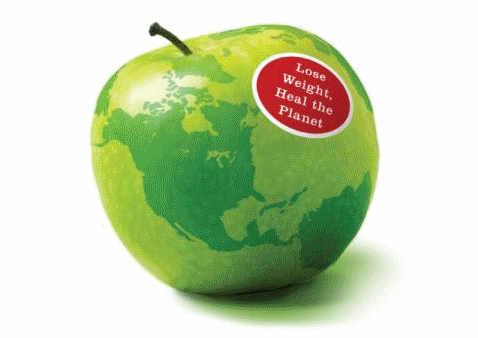This (geo)graphic was pulled directly off the cover of Mark Bittman’s new book “Food Matters”. It is of an unknown spatial reference system.
For those of you who found Michael Pollan’s “Omnivore’s Dilemma” very insightful, but less than actionable, you will like Mark Bittman’s new book “Food Matters”. It does a good job of describing the impacts of our food consumption on our Planet (Earth), from global warming to transmogrified landscapes due to the ever growing demand for meat, and other animal-derived food products. I think many (including myself) never think about how the supply chain behind animal-derived product consumption has completely reshaped the Earth over the past half century. Not to mention how it has reshaped the labor markets associated with food production (see Eric Schlosser’s “Fast Food Nation” for more on that topic).
As for “Food Matters”, there is a nice FORA.TV Video Podcast with Bittman talking about the origins of his book (did I mention that I have become addicted to FORA.TV?). He references a UN report entitled “Livestock’s Long Shadow” which addresses the impacts of our animal-derived food chain on the Earth, a report which is very interesting. But, his summary zingers in the Podcast (and the book) really drive home the point. He really makes you ask yourself why you are eating so many animal products (remember, milk and eggs are also products of animals – which are kept no more humanely than those primarily raised to be slaughtered for their meat, and which have a huge impact on the Earth). And, whether we could reduce the amount of animal products by 10 or 20% percent – which would have a massive impact on greenhouse gases.
Unfortunately, Bittman did not focus his point on overpopulation, which I still see as the major challenge. The number of domesticated animals impacting the Earth is directly tied to the number of people consuming animal products in their daily meals. While Bittman is correct that we (us First Worlders) all could consume less and live more healthy lives, as we succeed at bringing people worldwide out of poverty, their tastes will begin to mimic ours – only ballooning the existing population of domesticated animals (the US processes 10 billion animals a year).
So, I am happy to follow Bittman’s cookbook. But, if everyone on Earth ate that well, our planet would collapse from ecological devastation and accellerated global warming.
